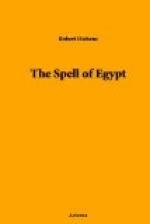A mist hung over the land. Out of it, with a sort of stern energy, there came to my ears loud hymns sung by the pilgrim voices—hymns in which, mingled with the enthusiasm of devotees en route for the holiest shrine of their faith, there seemed to sound the resolution of men strung up to confront the fatigues and the dangers of a great journey through a wild and unknown country. Those hymns led my feet to the venerable mosques of Cairo, the city of mosques, guided me on my lesser pilgrimage among the cupolas and the colonnades, where grave men dream in the silence near marble fountains, or bend muttering their prayers beneath domes that are dimmed by the ruthless fingers of Time. In the buildings consecrated to prayer and to meditation I first sought for the magic that still lurks in the teeming bosom of Cairo.
Long as I had sought it elsewhere, in the brilliant bazaars by day, and by night in the winding alleys, where the dark-eyed Jews looked stealthily forth from the low-browed doorways; where the Circassian girls promenade, gleaming with golden coins and barbaric jewels; where the air is alive with music that is feverish and antique, and in strangely lighted interiors one sees forms clad in brilliant draperies, or severely draped in the simplest pale-blue garments, moving in languid dances, fluttering painted figures, bending, swaying, dropping down, like the forms that people a dream.
In the bazaars is the passion for gain, in the alleys of music and light is the passion for pleasure, in the mosques is the passion for prayer that connects the souls of men with the unseen but strongly felt world. Each of these passions is old, each of these passions in the heart of Islam is fierce. On my return to Cairo I sought for the hidden fire that is magic in the dusky places of prayer.
A mist lay over the city as I stood in a narrow byway, and gazed up at a heavy lattice, of which the decayed and blackened wood seemed on guard before some tragic or weary secret. Before me was the entrance to the mosque of Ibn-Tulun, older than any mosque in Cairo save only the mosque of Amru. It is approached by a flight of steps, on each side of which stand old, impenetrable houses. Above my head, strung across from one house to the other, were many little red and yellow flags ornamented with gold lozenges. These were to bear witness that in a couple of days’ time, from the great open place beneath the citadel of Cairo, the Sacred Carpet was to set out on its long journey to Mecca. My guide struck on a door and uttered a fierce cry. A small shutter in the blackened lattice was opened, and a young girl, with kohl-tinted eyelids, and a brilliant yellow handkerchief tied over her coarse black hair, leaned out, held a short parley, and vanished, drawing the shutter to behind her. The mist crept about the tawdry flags, a heavy door creaked, whined on its hinges, and from the house of the girl there came an old, fat man bearing a mighty key. In a moment I was free of the mosque of Ibn-Tulun.




